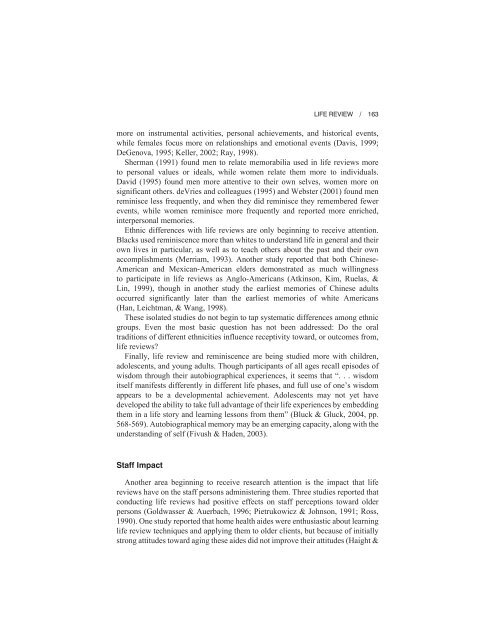life review: implementation, theory, research, and therapy - Wiki Home
life review: implementation, theory, research, and therapy - Wiki Home
life review: implementation, theory, research, and therapy - Wiki Home
Create successful ePaper yourself
Turn your PDF publications into a flip-book with our unique Google optimized e-Paper software.
more on instrumental activities, personal achievements, <strong>and</strong> historical events,<br />
while females focus more on relationships <strong>and</strong> emotional events (Davis, 1999;<br />
DeGenova, 1995; Keller, 2002; Ray, 1998).<br />
Sherman (1991) found men to relate memorabilia used in <strong>life</strong> <strong>review</strong>s more<br />
to personal values or ideals, while women relate them more to individuals.<br />
David (1995) found men more attentive to their own selves, women more on<br />
significant others. deVries <strong>and</strong> colleagues (1995) <strong>and</strong> Webster (2001) found men<br />
reminisce less frequently, <strong>and</strong> when they did reminisce they remembered fewer<br />
events, while women reminisce more frequently <strong>and</strong> reported more enriched,<br />
interpersonal memories.<br />
Ethnic differences with <strong>life</strong> <strong>review</strong>s are only beginning to receive attention.<br />
Blacks used reminiscence more than whites to underst<strong>and</strong> <strong>life</strong> in general <strong>and</strong> their<br />
own lives in particular, as well as to teach others about the past <strong>and</strong> their own<br />
accomplishments (Merriam, 1993). Another study reported that both Chinese-<br />
American <strong>and</strong> Mexican-American elders demonstrated as much willingness<br />
to participate in <strong>life</strong> <strong>review</strong>s as Anglo-Americans (Atkinson, Kim, Ruelas, &<br />
Lin, 1999), though in another study the earliest memories of Chinese adults<br />
occurred significantly later than the earliest memories of white Americans<br />
(Han, Leichtman, & Wang, 1998).<br />
These isolated studies do not begin to tap systematic differences among ethnic<br />
groups. Even the most basic question has not been addressed: Do the oral<br />
traditions of different ethnicities influence receptivity toward, or outcomes from,<br />
<strong>life</strong> <strong>review</strong>s?<br />
Finally, <strong>life</strong> <strong>review</strong> <strong>and</strong> reminiscence are being studied more with children,<br />
adolescents, <strong>and</strong> young adults. Though participants of all ages recall episodes of<br />
wisdom through their autobiographical experiences, it seems that “. . . wisdom<br />
itself manifests differently in different <strong>life</strong> phases, <strong>and</strong> full use of one’s wisdom<br />
appears to be a developmental achievement. Adolescents may not yet have<br />
developed the ability to take full advantage of their <strong>life</strong> experiences by embedding<br />
them in a <strong>life</strong> story <strong>and</strong> learning lessons from them” (Bluck & Gluck, 2004, pp.<br />
568-569). Autobiographical memory may be an emerging capacity, along with the<br />
underst<strong>and</strong>ing of self (Fivush & Haden, 2003).<br />
Staff Impact<br />
LIFE REVIEW / 163<br />
Another area beginning to receive <strong>research</strong> attention is the impact that <strong>life</strong><br />
<strong>review</strong>s have on the staff persons administering them. Three studies reported that<br />
conducting <strong>life</strong> <strong>review</strong>s had positive effects on staff perceptions toward older<br />
persons (Goldwasser & Auerbach, 1996; Pietrukowicz & Johnson, 1991; Ross,<br />
1990). One study reported that home health aides were enthusiastic about learning<br />
<strong>life</strong> <strong>review</strong> techniques <strong>and</strong> applying them to older clients, but because of initially<br />
strong attitudes toward aging these aides did not improve their attitudes (Haight &


